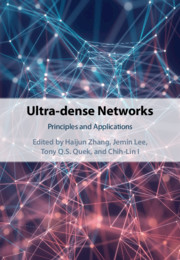Book contents
- Frontmatter
- Contents
- List of Contributors
- Part I Overview
- Part II Physical Layer Design
- Part III Resource Allocation and Network Management
- 9 Delay and Traffic Matching in Ultra-dense Networks
- 10 Traffic Offloading in Software Defined Ultra-dense Networks
- 11 Resource Allocation in Ultra-dense Networks
- 12 Wireless Edge Caching in Ultra-dense Networks
- 13 User Association in Ultra-dense Networks
- 14 UAV-Based Ultra-dense Networks
- 15 Generalized Low-Rank Optimization for Ultra-dense Fog-RANs
- Part IV Field Trials and Tests
- Index
13 - User Association in Ultra-dense Networks
from Part III - Resource Allocation and Network Management
Published online by Cambridge University Press: 12 October 2020
- Frontmatter
- Contents
- List of Contributors
- Part I Overview
- Part II Physical Layer Design
- Part III Resource Allocation and Network Management
- 9 Delay and Traffic Matching in Ultra-dense Networks
- 10 Traffic Offloading in Software Defined Ultra-dense Networks
- 11 Resource Allocation in Ultra-dense Networks
- 12 Wireless Edge Caching in Ultra-dense Networks
- 13 User Association in Ultra-dense Networks
- 14 UAV-Based Ultra-dense Networks
- 15 Generalized Low-Rank Optimization for Ultra-dense Fog-RANs
- Part IV Field Trials and Tests
- Index
Summary
In recent years, the overall network data traffic is dramatic increasing,a promising solution is the deployment of ultra dense networks (UDNs) combined with millimeter wave (mmWave) communication technology, which is expected to enhance the overall performance of the network in terms of energy efficiency and load balancing. In this chapter,user association and power allocation inmmWave-based UDNs is considered with attention to load balance constraints, energy harvesting by base stations, user quality of service requirements, energy efficiency, and cross-tier interference limits. This chapter not only establish the system utility optimal function model in the limitations of power and QoS, but also gives an iterative gradient user association and power allocation algorithm to resolve the optimization issue. This algorithm provides a best ratio of convergence and can get a near optimal scheme. In addtion, through utilizing Lagrangian dual decomposition, the dual optimization issue is disintegrated to two sub-problems, we can resolve them respectively. The simulation datum indicate that our method is effective.
Keywords
- Type
- Chapter
- Information
- Ultra-dense NetworksPrinciples and Applications, pp. 239 - 258Publisher: Cambridge University PressPrint publication year: 2020
- 1
- Cited by



